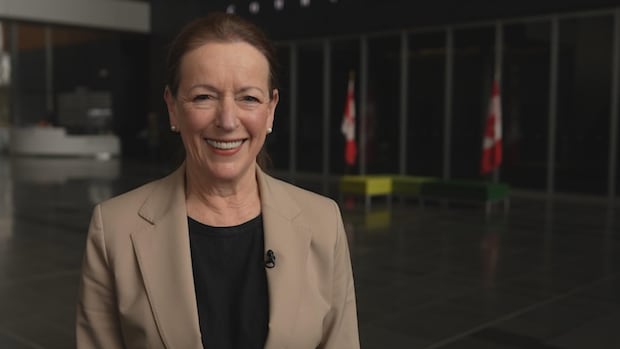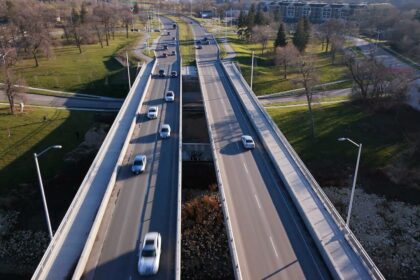British ColumbiaIf elected mayor, Linda Annis says she will push for a light rail system, scrap the proposed 10,000-seat arena being considered for the city centre, and put an end to the city’s opposition of the Surrey Police Service transition. Early campaigning in some municipalities partly prompted by tight campaign finance rulesJustin McElroy · CBC News · Posted: Sep 05, 2025 8:00 AM EDT | Last Updated: 3 hours agoLinda Annis, a Surrey city councillor, has announced she will challenge incumbent Brenda Locke for Mayor in the 2026 municipal elections. (CBC)”Is it a bit too early to announce a run for Mayor? The short answer is no.”Those were the words of Linda Annis in a hotel ballroom in Surrey, B.C., on Wednesday, as the two-term councillor announced she would challenge incumbent Brenda Locke in the October 2026 municipal election. “Surrey will be the first city in our province to hit one million people,” said Annis, “and right now under [Mayor] Brenda Locke and her four councillors, we’re not ready.”If elected mayor, Annis said she will push for a light rail system, scrap the proposed 10,000-seat arena being considered for the city centre, and put an end to the disputes and lawsuits that Locke has led in an attempt to stop the transition to the Surrey Police Service. “Instead of picking fights with the provincial government, or the police board … city council should be picking fights with gangs, extortionists, and drug dealers,” she said, adding that her Surrey First Party will be announcing council candidates in the coming weeks.The party dominated Surrey politics for over a decade under mayors Dianne Watts and Linda Hepner, but has been an opposition party the last seven years under mayors Locke and Doug McCallum.WATCH | Annis announces run for mayor: Surrey city councillor Linda Annis announces her candidacy for mayorLinda Annis, who has served as a Surrey city councillor since 2018, says she intends to run for mayor in the 2026 municipal election. Speaking to BC Today guest host Amy Bell, Annis outlined her priorities, including an investment in infrastructure, jobs, transportation and public safety, and criticized the time Surrey has spent on its policing transition. ‘Abbotsford has an arena, Langley has an arena’Locke is planning to run for re-election, and in response, framed Annis as an opposition councillor who’s uninterested in finding solutions to complicated issues. “Leadership is often about making very tough decisions and we’ve had to make some very tough and difficult decisions,” she said. Locke alleges that Annis hasn’t fought hard for any particular positions in her seven years on council.”And I can tell you that through all of this, Coun. Annis has never raised any of the issues … in press releases or at the council chamber. I don’t know whether she’s afraid of debate or forgets.”Locke also defended the city’s lawsuits and conflicts around the transition to an independent police force — which her winning mayoral campaign was centred around trying to stop — by arguing that they exposed the true costs of the transition and forced the province to give them more financial assistance.And she defended wanting to build a 10,000-seat arena by saying it was a necessary step in Surrey’s evolution. At this point, the project has no budget or core tenant.”We’re going to be a city of a million people, and we don’t have a large arena or gathering place in the city,” she said. “Abbotsford has a large arena. Langley has a larger arena than we do … that doesn’t make sense for a city of our size.”Benefits of early campaigningAnnis is one of many political candidates in southwest B.C. who are announcing their plans for the municipal election more than a year in advance, much earlier than past elections.In Vancouver, Mayor Ken Sim’s former chief of staff Kareem Allam has launched a campaign and political party, a group called the Conservative Electors Association has registered political parties in many municipalities across the province, and New Westminster’s opposition party will be announcing its own mayoral candidate on Sept. 18. University of B.C. political scientist Stewart Prest said the longer campaign is the product of several factors — but a significant one is B.C.’s campaign finance laws, passed in 2017, that limit the amount donors can give parties and individual candidates in a year (the current limit is around $1,400). “It’s an incentive for candidates to get going more quickly so they can have multiple years of fundraising,” he said. “You can’t just wait to the summer before the election to have a number of large checks written for you, you’ve got to build a subscription based of reliable donors.”Prest acknowledged that it might cause fatigue and cynicism with some voters, but pointed to a silver lining of B.C.’s municipal election season beginning more than 400 days before the actual vote.”As voters, we can use this time to get to know the candidates and the issues a little bit more,” he said.ABOUT THE AUTHORJustin is the Municipal Affairs Reporter for CBC Vancouver, covering local political stories throughout British Columbia.
Surrey city councillor Linda Annis announces mayoral campaign more than a year ahead of election











